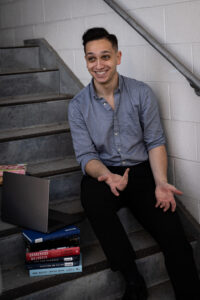Student Stories: Eric Whitmer
Eric Whitmer
Class of 2023
Major: Percussion Performance

When you think of the orchestra, it might conjure to mind visions of elegance, wealth, and high society. But what about the modern American orchestra? How has it developed since its inception? Who does it benefit, and what does it owe to its community? These are just some of the questions that senior Eric Whitmer is exploring in their senior thesis and Immersion Vanderbilt project. The Percussion Performance major, who is also pursuing a minor in Business and a concentration in Musicology, began this research journey far before their time at Vanderbilt and the Blair School of Music.
Growing up in Redding, California, Eric transferred to a local charter arts school as a child. Despite growing up in an area that was very rural and resource-scarce, the school provided Eric with the ability to be immersed in a rich and intensive music education from an early age. The North State Symphony, a local orchestra in the area, would also volunteer frequently at the school. Eric immediately fell in love with playing music, and unbeknownst to them, they would later go on to work with the North State Symphony during high school and, much later, college as their section percussionist and a member of the board of directors. Eric was elected to the board of directors during spring 2020 amidst a pandemic, and the aftermath of the murder of George Floyd in Minneapolis, Minnesota. Eric recalls grappling with the new position and how the organization should respond.
“…And so all of a sudden, we're just trying to put two and two together, and we start to ask these questions of what does it mean to be an orchestra in America right now? And what does it look like? And where do these conversations that we need to have happen, happen?” states Eric.
As the child of two professors, Eric immediately knew what their next steps should be.
“I did what any good academic would do after being presented with a number of questions that were really confusing and challenging. I started to research it obsessively,” Eric explains. Since my dad's a historian, growing up, I would always get lectures about the Vietnam War or labor history during car trips or whatever we were doing. So these topics really speak to me.”
Eric then took the next logical step in their research plan. They reached out to Professor Robert Fry, Senior Lecturer in Musicology and Ethnomusicology and Eric’s senior thesis advisor. Eric knew that Professor Fry, who has interest in music as a form of protest, would be the perfect mentor as they began researching the history of the orchestra as a political entity.
“Eric’s project is a perfect example of Immersion Vanderbilt,” shared Professor Fry. “While Eric’s work is grounded in quantitative and qualitative research, the project does not stop there, going beyond a research paper to include suggestions for creating a more diverse and inclusive symphonic tradition.”
As an arts administrator and newly instated board member for the symphony, Eric wanted to better understand the importance and impact of the organization they so cherished.
“I need to understand the history of it because I'm a practitioner of this art form.” Eric says. “I love playing with the North State Symphony. It's one of the things that brings me so much joy in this world. However, If I'm going to play music and I'm going to participate in this artform, I need to actually have an understanding of the larger implications of doing so.”
The first stage of Eric’s project consisted of an independent study under Professor Fry, looking at the history of the American orchestra with a focus on “time and spaces where the orchestra exerted political influence or political influence was exerted on the orchestra.” Organically, this research led to the second stage of Eric’s research, conducting interviews with dozens of industry professionals involved with orchestras across the United States. Through a strategic partnership with the Association of California Symphony Orchestras, one interview led to another, and Eric had soon contacted nearly over 300 professionals for interviews.
“The second stage was asking the same baseline questions, and then we kind of diverged from there. What’s the role of the orchestra? What responsibilities do we have towards our community? What responsibilities does the community have to us? What role do we play in our community?” Eric stated. “That method was this qualitative research of just talking to people and trying to get where they are coming from.”
This stage of Eric’s project was supported in part by a Vanderbilt Undergraduate Summer Research Program (VUSRP) Littlejohn Fellowship during summer 2021. VUSRP allows students to conduct fulltime research with a Vanderbilt faculty for 10 weeks over the summer. At the conclusion of this program, Eric was able to present at the Vanderbilt Undergraduate Research Fair, sharing the findings of the project.
Over summer 2022, Eric has been focused on transcribing interviews from the experience with support from Sara Manus, Music Librarian in the Anne Potter Wilson Music Library.
“There are few things more rewarding than working with a student who is passionate about research,” Manus shares. “Eric has documented a unique moment in American orchestras, and their archive will be an excellent addition our digital collections.”
Additionally, Eric is busy navigating their last year at Vanderbilt and working on their senior thesis. While the thesis itself will serve as the project’s final culminating piece, Eric will also be working on a senior recital prior to graduation, a performance that is two years in the making and deeply personal to issues they have faced during their time at Vanderbilt. Eric views the senior recital as a practical application of the years of work that has been conducted in this project, providing them with an outlet to test this research and make a difference through music. Making a difference is a reoccurring theme for Eric’s work.
“There is this value in Judaism, tikkun olam, which means to repair the world. And there's this kind of caveat that goes along with it from Pirkei Avot, ‘It is not your duty to finish the work, but neither are you at liberty to neglect it,'" explains Eric.

Eric goes on to tell the story of an interview they had during their research with the South Dakota Symphony about SDS’s work with the Lakota Music Project (LMP). One part of the LMP is a summer camp for the children of the Lakota Tribe, allowing them to come to a local community college, work with composers to compose their own music, and hear it performed live by musicians. In the interview, South Dakota Symphony shared with Eric about a young Lakota girl who composed a piece in honor of her missing aunt and the many missing and murdered indigenous women in the United States. This story, among many others, drives Eric, pushing them to continue their research and bring a light to how the American orchestra can be used as a tool for social good.
“Regardless of whether or not you enjoy classical music, these are the kinds of stories and interactions that give me so much drive. I am motivated by empowering people to share stories and connection through music, and so this research is many ways an embodiment of that. There is so much power in talking about music in this way,” says Eric. “Ultimately what I hope this thesis does is make people want to be better humans. It’s a small ask, but that’s what I’m trying to do.”
